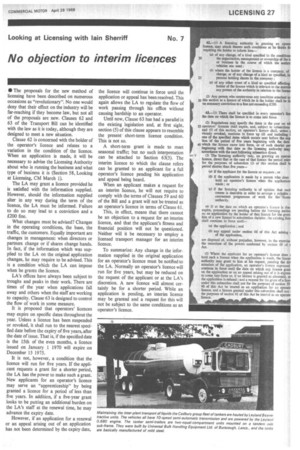Looking at Licensing with lain Sherriff No. 7
Page 29

If you've noticed an error in this article please click here to report it so we can fix it.
No objection to interim licences
• The proposals for the new method of licensing have been described on numerous occasions as "revolutionary". No one would deny that their effect on the industry will be far-reaching if they become law, but not all of the proposals are new. Clauses 62 and 63 of the Transport Bill can be identified with the law as it is today, although they are designed to meet a new situation.
Clause 62 is concerned with the holder of the operator's licence and relates to a variation in the condition of the Licence. When an application is made, it will be necessary to advise the Licensing Authority about who is running the business and what type of business it is (Section 58, Looking at Licensing, CM March 1).
The LA may grant a licence provided he is satisfied with the information supplied. However, should the information supplied alter in any way during the term of the licence, the LA must be informed. Failure to do so may lead to a conviction and a £200 fine.
What changes must be advised? Changes in the operating conditions, the base, the traffic, the customers. Equally important are changes in management; when directors or partners change or if shares change hands. In fact, if the information which was supplied to the LA on the original application changes, he may require to be advised. This is a condition which the LA can impose when he grants the licence.
LA's offices have always been subject to troughs and peaks in their work. There are times of the year when applications fall away and others when the staff are working to capacity. Clause 63 is designed to control the flow of work in some measure.
It is proposed that operators' licences may expire on specific dates throughout the year. Unless a licence has been suspended or revoked, it shall run to the nearest specified date before the expiry of five years, after the date of issue. That is, if the specified date is the 15th of the even months, a licence issued on January 1 1970 will expire on December 15 1975.
It is not, however, a condition that the licence will run for five years. If the applicant requests a grant for a shorter period, the LA has the power to make such a grant. New applicants for an operator's licence may serve an "apprenticeship" by being granted a licence for a period of less than five years. In addition, if a five-year grant looks to be putting an additional burden on the LA's staff at the renewal time, he may advance the expiry date.
However, if an application for a renewal or an appeal arising out of an application has not been determined by the expiry date, the licence will continue in force until the application or appeal has been resolved. This again allows the LA to regulate the flow of work passing through his office without causing hardship to an operator.
Until now, Clause 63 has had a parallel in the existing legislation and, at first sight, section (5) of this clause appears to resemble the present short-term licence condition. This is not so.
A short-term grant is made to meet seasonal traffic; but no such interpretation can be attached to Section 63(5). The interim licence to which the clause refers can be granted to an applicant for a full operator's licence pending his application and appeal being heard.
When an applicant makes a request for an interim licence, he will not require to comply with the terms of Clauses 59 and 60 of the Bill and a grant will not be treated as an operator's licence in terms of Clause 61.
This, in effect, means that there cannot be an objection to a request for an interim licence, and that the applicant's fitness and financial position will not be questioned. Neither will it be necessary to employ a licensed transport manager for an interim licence.
To summarize: Any change in the information supplied in the original application for an operator's licence must be notified to the LA. Normally an operator's licence will run for five years, but may be reduced on the request of the applicant or at the LA's discretion. A new licence will almost certainly be for a shorter period. While an application is pending, an interim licence may be granted and a request for this will not be subject to the same conditions as an operator's licence.




















































































































